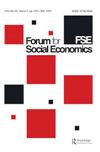{"title":"金融化分类系统与公共政策:危机应对的跨学科方法","authors":"A. Baranes, Carrie Coward Bucher","doi":"10.1080/07360932.2023.2206023","DOIUrl":null,"url":null,"abstract":"We utilize classification systems research to examine the disproportionate impact of COVID-19 on marginalized communities and the failures of policy makers to adequately respond to those most in need. Classification situations are individual positions within the market, generated via the mass collection and aggregation of individual financial and behavioral data, that are used to categorize people into price-differentiated opportunities. In a financialized economy, where profits are increasingly accumulated through financial channels, thereby entrenching the role of financial institutions and motives at the center of economic activity, one's classification situation operates to maximize value for shareholders. Importantly, in a neoliberal economy, where the logic of the market is used to guide social and political policy more broadly, classification situations are the mechanism by which individuals are allocated resources, opportunities, hardships, and other socio-political economic outcomes. In this paper we argue that the fiscal and monetary responses to COVID-19 were designed to support financialized interests and, as a consequence, the resources and protections of the state were allocated not to those most at risk but, rather, to those whose classification situation promised a stronger return on investment. © 2023 The Association for Social Economics.","PeriodicalId":42478,"journal":{"name":"Forum for Social Economics","volume":null,"pages":null},"PeriodicalIF":0.6000,"publicationDate":"2023-05-08","publicationTypes":"Journal Article","fieldsOfStudy":null,"isOpenAccess":false,"openAccessPdf":"","citationCount":"0","resultStr":"{\"title\":\"Financialized Classification Systems and Public Policy: An Interdisciplinary Approach to Crisis Response\",\"authors\":\"A. Baranes, Carrie Coward Bucher\",\"doi\":\"10.1080/07360932.2023.2206023\",\"DOIUrl\":null,\"url\":null,\"abstract\":\"We utilize classification systems research to examine the disproportionate impact of COVID-19 on marginalized communities and the failures of policy makers to adequately respond to those most in need. Classification situations are individual positions within the market, generated via the mass collection and aggregation of individual financial and behavioral data, that are used to categorize people into price-differentiated opportunities. In a financialized economy, where profits are increasingly accumulated through financial channels, thereby entrenching the role of financial institutions and motives at the center of economic activity, one's classification situation operates to maximize value for shareholders. Importantly, in a neoliberal economy, where the logic of the market is used to guide social and political policy more broadly, classification situations are the mechanism by which individuals are allocated resources, opportunities, hardships, and other socio-political economic outcomes. In this paper we argue that the fiscal and monetary responses to COVID-19 were designed to support financialized interests and, as a consequence, the resources and protections of the state were allocated not to those most at risk but, rather, to those whose classification situation promised a stronger return on investment. © 2023 The Association for Social Economics.\",\"PeriodicalId\":42478,\"journal\":{\"name\":\"Forum for Social Economics\",\"volume\":null,\"pages\":null},\"PeriodicalIF\":0.6000,\"publicationDate\":\"2023-05-08\",\"publicationTypes\":\"Journal Article\",\"fieldsOfStudy\":null,\"isOpenAccess\":false,\"openAccessPdf\":\"\",\"citationCount\":\"0\",\"resultStr\":null,\"platform\":\"Semanticscholar\",\"paperid\":null,\"PeriodicalName\":\"Forum for Social Economics\",\"FirstCategoryId\":\"1085\",\"ListUrlMain\":\"https://doi.org/10.1080/07360932.2023.2206023\",\"RegionNum\":0,\"RegionCategory\":null,\"ArticlePicture\":[],\"TitleCN\":null,\"AbstractTextCN\":null,\"PMCID\":null,\"EPubDate\":\"\",\"PubModel\":\"\",\"JCR\":\"Q4\",\"JCRName\":\"ECONOMICS\",\"Score\":null,\"Total\":0}","platform":"Semanticscholar","paperid":null,"PeriodicalName":"Forum for Social Economics","FirstCategoryId":"1085","ListUrlMain":"https://doi.org/10.1080/07360932.2023.2206023","RegionNum":0,"RegionCategory":null,"ArticlePicture":[],"TitleCN":null,"AbstractTextCN":null,"PMCID":null,"EPubDate":"","PubModel":"","JCR":"Q4","JCRName":"ECONOMICS","Score":null,"Total":0}
引用次数: 0
Financialized Classification Systems and Public Policy: An Interdisciplinary Approach to Crisis Response
We utilize classification systems research to examine the disproportionate impact of COVID-19 on marginalized communities and the failures of policy makers to adequately respond to those most in need. Classification situations are individual positions within the market, generated via the mass collection and aggregation of individual financial and behavioral data, that are used to categorize people into price-differentiated opportunities. In a financialized economy, where profits are increasingly accumulated through financial channels, thereby entrenching the role of financial institutions and motives at the center of economic activity, one's classification situation operates to maximize value for shareholders. Importantly, in a neoliberal economy, where the logic of the market is used to guide social and political policy more broadly, classification situations are the mechanism by which individuals are allocated resources, opportunities, hardships, and other socio-political economic outcomes. In this paper we argue that the fiscal and monetary responses to COVID-19 were designed to support financialized interests and, as a consequence, the resources and protections of the state were allocated not to those most at risk but, rather, to those whose classification situation promised a stronger return on investment. © 2023 The Association for Social Economics.


